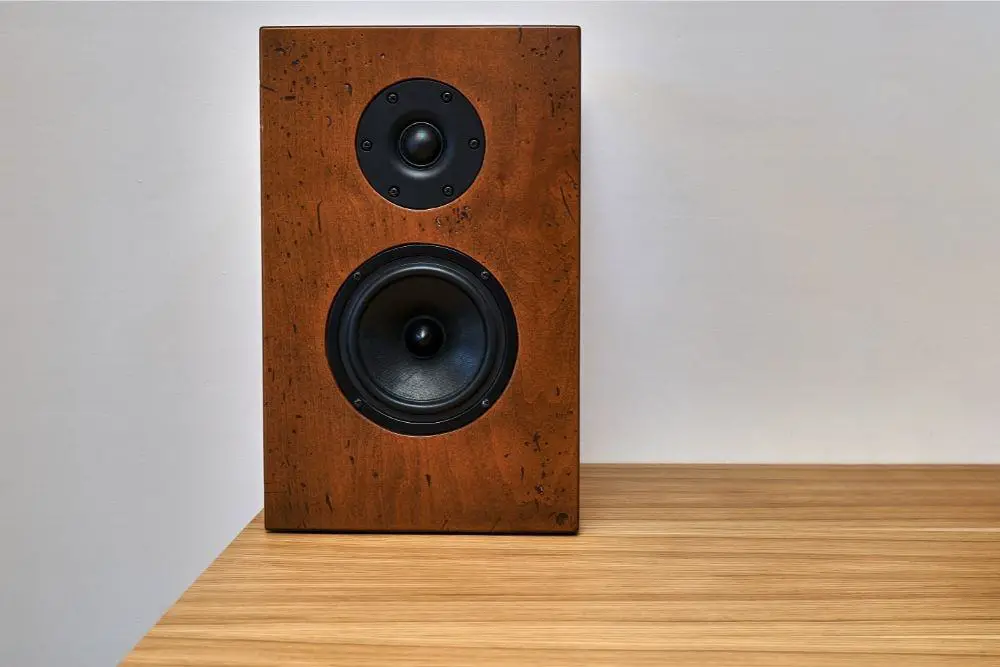You ask, are Bookshelf speakers good?
Bookshelf speakers get their name for being small enough to fit on a shelf or bookcase.
However, they can still vary in size and weight.
They are larger than a portable speaker but more compact than floor speakers.
They deliver loud amplification and solid stereo sound for any room size, small or medium.
Likewise, they won’t give you the same room-rumbling, ceiling-shuddering bass that a full-sized floor set of speakers will give you.
But if you need a sound system for your office, den, bedroom, or even a medium-sized living area, they will be more than enough.

If you want to pair them with a home system, you can link them to a subwoofer and amp up your listening experience.
That way, they won’t make you feel like you are in a movie theater, but… close enough.
Bluetooth speakers and headphones have made advancements in the last few years.
But nothing quite compares to a good speaker system that can deliver you tunes all day long with epic quality.
While they aren’t portable, it means they don’t suffer from battery life problems, and since they’re ‘shelf sized,’ you can fit them comfortably into your home’s ensemble.
There’s no need to rearrange your space to fit your speakers in completely.
They’re big enough to give you what you want without requesting a whole home re-do.
Can I put bookshelf speakers on a bookshelf?
Realistically, you can put bookshelf speakers anywhere.
They are small enough to put on a table, shelf, cabinet, or wherever.
However, you need to be mindful of what else is in the space you put the speakers in. If your shelf is enclosed, the speakers’ sound may resonate off of it.
You should also consider the make-up of the shelf, the wall brackets, and the like.
If you put your bookshelf speakers on a bookshelf, you should aim the speaker towards the listener’s ears. You can buy or make foam wedges to decouple the speaker from the shelf further and prevent any problems.
Doing this can help prevent vibrating items on the shelf or transmitting the vibration from the soundwaves to other speakers, yielding some weird noise. Many people have the center speaker on a shelf angled towards the listener’s ears.
A separate shelf for the center could isolate it from other speakers better. You must ensure that your speakers are at the front of the shelf, hanging off very slightly. Any shelf in front of the drivers becomes a surface for sound to reflect off.
The issue with placing bookshelf speakers on a bookshelf is that sound will typically resonate off it, especially if enclosed. This does depend on the solidity of the material. A set-up like this could entirely change the sound emitting from that area.
Can I use bookshelf speakers with TV?
You can always use passive bookshelf speakers if you do not want a massive sound system hooked up to your TV.
However, if you do this, you will need an AV receiver to hook them up.
These AV receivers will cost about the same as your speakers. But this can be a good sacrifice if you are determined to get that good sound without sacrificing space in your home with big bulky speakers or a surround sound system.
It’s a more expensive option than buying a soundbar, as you will have to buy both speakers and an AV receiver, but doing this has some stellar advantages.
You gain more flexibility to add to your system later. This is much more doable if you want to add a center channel speaker or a subwoofer. And you will not be as easily tied into a brand ecosystem. You could mix and match up future speakers by distinct brands, as every speaker can communicate through the AV receiver.
The biggest advantage of using bookshelf speakers with an AV receiver for your TV system is that the audio quality will be better, and the positioning of these speakers will naturally make the sound system sound more immersive and more like a home cinema setup.
Are Bookshelf Speakers Good For Home Theater?
Bookshelf speakers are often considered a beneficial addition to a home theater setup.
These compact speakers are designed to be placed on a bookshelf or mounted on a wall, offering a convenient and space-saving option for enhancing the audio experience in a living room or entertainment area.
While they may not produce the same level of bass response as larger floor-standing speakers or dedicated subwoofers, bookshelf speakers can still deliver impressive sound quality and clarity, making them suitable for smaller or medium-sized spaces.
Additionally, their versatility allows users to position them strategically for enhanced stereo imaging and optimal listening angles.
Bookshelf speakers are often praised for their ability to reproduce detailed sound, accurately reproducing the nuances of music, dialogue, and sound effects in movies, resulting in an immersive home theater experience.
Nevertheless, it is important to consider factors such as room size, personal preferences, and available budget when deciding whether bookshelf speakers are the right choice for a specific home theater setup.
Can You Use Bookshelf Speakers For Surround?
Bookshelf speakers are compact, typically smaller, and designed to be placed on a shelf, table, or any elevated surface.
They are primarily used for stereo sound reproduction, emphasizing clarity and accuracy.
Although they may not provide the same immersive experience as dedicated surround speakers, bookshelf speakers can be employed as front or rear speakers in a surround sound system.
These speakers can still contribute to a rich audio experience, especially when combined with a center speaker and a subwoofer.
Positioning the speakers correctly and adjusting the settings to optimize the surround sound effect is important.
While specialized surround speakers are often recommended for a more comprehensive audio experience, utilizing bookshelf speakers can be a viable option, particularly in smaller spaces or for those on a limited budget.
How do I choose bookshelf speakers?
So, you have your heart set on getting a set of bookshelf speakers, but you may not understand all that high-tech jargon when you look at the product. You don’t have to. You can know what you are getting if you understand the basics.
First, take into consideration the hertz (Hz). If this number is low, you will get some heavy bass. Then consider Watts (W). The higher the number of the wattage, the greater the output you can expect to get from your speakers. This is truly relevant when you are matching bookshelf speakers to an amplifier.
Also, consider Drivers. Basic bookshelf speakers will have two woofers (these are the things that generate bass), and tweeters (these are the things that produce those higher-frequency sounds). Buying a speaker set with a third mid-range driver will produce a full range of sound.
These things are all relevant to what you will get from your speaker.
If you are setting up some bookshelf speakers to create a home cinema system, you may want to ensure that your speakers have a third mid-range driver to benefit from all the sound in the movies you watch.
If it is for music in your den, and you tend to listen to more heavy bass music, you will want to have a lower Hertz number.
What are bookshelf speakers used for?
Bookshelf speakers are like any other home speaker.
You can use them for whatever you want to. There are no hard or fast rules on what you must use them for.
Some may use them for a sound system at barbecue parties, house parties, and just dancing on a rainy Sunday afternoon, whereas others may hook them up to the TV and create a home cinema system. The possibilities are endless.
These speakers are meant to rest on a shelf, a table, or any other elevated surface… anywhere but the floor. They maximize sound for small to medium-sized spaces.
Remember, just because they’re called ‘bookshelf speakers’ does not mean they must go on a bookshelf.
Some bookshelf speakers are geared up specifically for movie buffs and their home cinema set-ups. Others are more geared up for music experience, taken to a godly level.
If you want to build your home theater system, you can use bookshelf speakers.
While you can take charge and buy a more elaborate and specialty home theater set-up, that option is not for everybody.
Many people may not want to dedicate to that kind of commitment.
In that case, bookshelf speakers are a fantastic and interchangeable option, too, so there is always a plus side.
